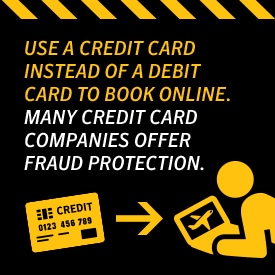5 tips to protect yourself from online travel booking scams
Thanks to the Internet, booking travel online is simple. But as your ideas of a spring break or summer vacation take shape, remember to be cautious when making reservations online.

Thanks to the Internet, booking travel online is simple. But as your ideas of a spring break or summer vacation take shape, remember to be cautious when making reservations online. The number of phony travel booking websites is growing because they’re so successful at scamming consumers. Learn what to do so you don’t take a quick trip to Fraudville instead of your dream destination.

Fake Travel Reservation Websites
According to estimates by the American Hotel & Lodging Association, approximately 15 million online hotel reservations are made on bogus third-party sites every year. These rogue websites trick people into thinking they’re reserving directly with their hotel of choice. Instead, the victims are making reservations on phony sites set up to steal their money, credit card information, and dreams of a relaxing overnight stay. With cybercriminals pocketing more than $1.3 billion in fake hotel reservations, consumers need to beware when booking hotel rooms and other travel reservations online — such as for airline flights and rental cars, too.
How to Avoid Online Travel Reservation Scams
1. Go directly to the official website of the hotel, airline, or rental car agency to book your reservations. It should have “HTTPS” in the URL. If you’re not sure you’re on a real site, call the company to verify. Or try Norton Safe Web to find out if a website is safe, for free.
2. If you decide to use a third-party site, choose a well-known and reputable brand.
3. Get recommendations for trusted travel companies or sites from your network of friends and family. If you’re ever uncertain about if a company is legitimate, check with the Better Business Bureau.
4. Use a credit card instead of a debit card to book online. In case the website is phony, you won’t have given the cybercriminals direct access to your bank account. Many credit card companies offer fraud protection.
5. After you make an online reservation, always call the company afterward to confirm. If there is no record of your reservation, it’s better to know sooner rather than later. You’ll be able to alert your credit card company, report the fraud, and still have time to book reservations with the real deal.
Editorial note: Our articles provide educational information for you. Our offerings may not cover or protect against every type of crime, fraud, or threat we write about. Our goal is to increase awareness about Cyber Safety. Please review complete Terms during enrollment or setup. Remember that no one can prevent all identity theft or cybercrime, and that LifeLock does not monitor all transactions at all businesses. The Norton and LifeLock brands are part of Gen Digital Inc.





Want more?
Follow us for all the latest news, tips and updates.